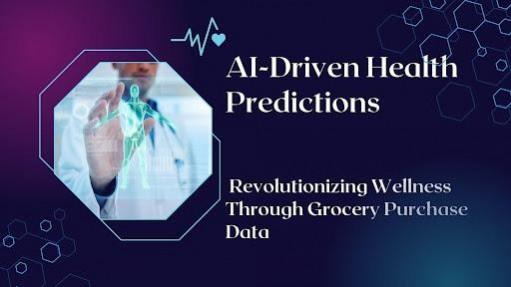
In a world increasingly driven by data, the ability to leverage everyday activities for health improvement is rapidly evolving. The integration of artificial intelligence (AI) into routine habits offers innovative approaches to preventive healthcare. Tenny Enoch Devadas, a specialist in AI applications in healthcare, introduces a cutting-edge system that analyzes grocery purchases to predict health risks and promote wellness.
Grocery Data as a Health Indicator
Grocery shopping generates data about dietary habits, which AI systems analyze to detect potential health risks. This innovative approach links everyday behaviors to preventive health measures. While traditional studies correlate diet and health, this AI-driven system uses advanced machine learning to deliver personalized insights. By analyzing grocery receipt data, it categorizes items into nutritional groups, predicting risks like obesity and heart disease based on purchasing patterns, offering a more powerful and precise health prediction tool than human observation alone.
The Power of Deep Learning
This AI system utilizes deep learning, specifically Convolutional Neural Networks (CNNs) and Recurrent Neural Networks (RNNs), to analyze grocery receipts. CNNs extract details like item names, while RNNs assess purchasing patterns over time. The system identifies potential health risks, such as diabetes or heart disease, based on frequent processed food purchases, while a diet rich in fruits and vegetables signals lower risk. By recognizing these patterns, the system predicts short- and long-term health risks and provides personalized feedback to users.
Personalized Wellness Campaigns
One of the most innovative aspects of this system is its ability to generate personalized wellness campaigns. Based on the health predictions derived from grocery purchases, the system creates tailored recommendations aimed at improving dietary habits and promoting overall wellness. These campaigns may include advice on healthier food options, reminders for preventive health checkups, and even suggestions for alternative products with better nutritional value.
Natural Language Processing (NLP) techniques help craft personalized messages that are both informative and engaging, increasing the likelihood of user adherence. By offering timely and relevant recommendations, the system not only promotes healthier choices but also encourages long-term behavioral changes.
Enhancing Public Health Initiatives
This AI-powered system offers broader public health benefits by aggregating anonymized data from large populations to reveal dietary trends and their impact on community health. Health authorities can use these insights to inform public health campaigns and policy changes promoting better nutrition and healthier lifestyles. Additionally, AI-driven grocery purchase analysis helps identify patterns related to issues like obesity or nutritional deficiencies, enabling targeted interventions that address these concerns at a population level.
Addressing Ethical Considerations
As with any AI-driven system, ethical considerations are paramount. The use of personal data, particularly related to health, must be handled with the utmost care. This system ensures data privacy by adhering to strict regulations, such as the General Data Protection Regulation (GDPR). Users are also required to provide informed consent before their data is analyzed, ensuring transparency and trust.
Another challenge is the potential for algorithmic bias. AI systems are only as good as the data they are trained on. If the training data is not representative of diverse populations, the system may produce biased predictions. To mitigate this risk, developers must employ diverse datasets and regularly audit the system to ensure fairness and accuracy across all demographic groups.
In conclusion, Tenny Enoch Devadas highlights the transformative potential of AI in healthcare through the analysis of grocery purchase data. By providing personalized health insights and promoting wellness, this innovative system paves the way for a new era of preventive healthcare. As the system evolves, incorporating data from wearable devices and expanding to broader lifestyle behaviors, it will continue to empower individuals to make informed decisions about their health, while also supporting public health initiatives at a larger scale.









